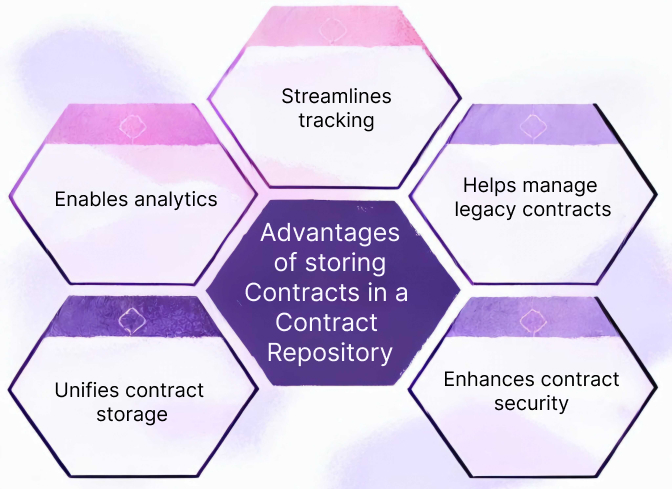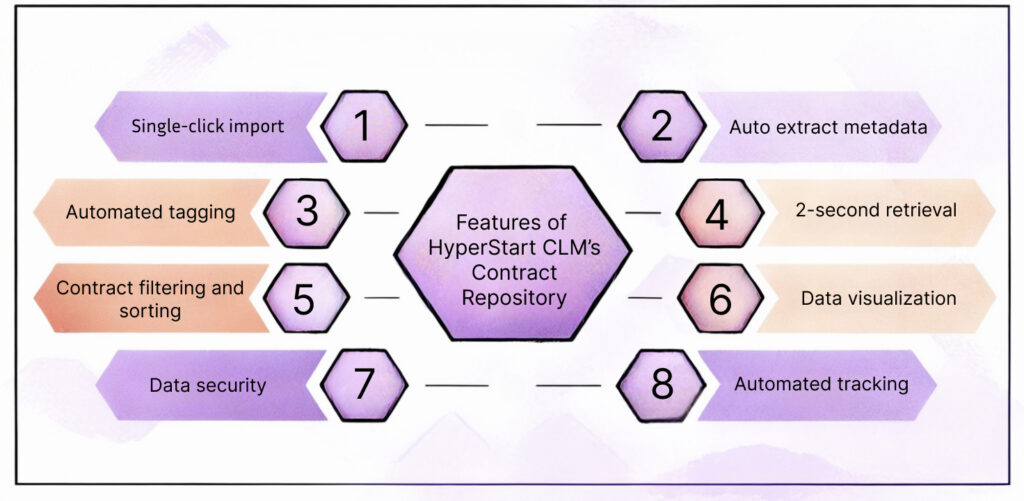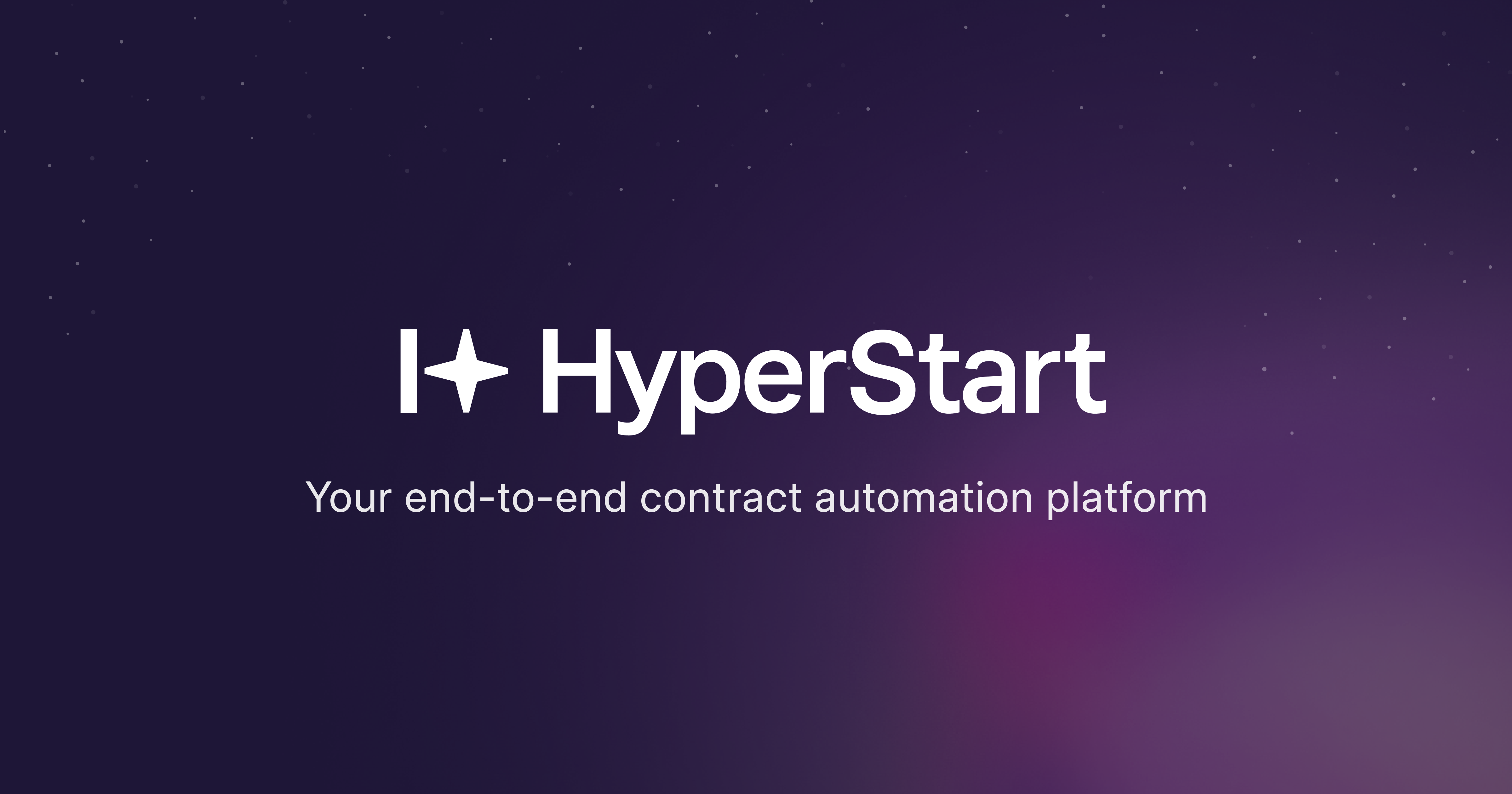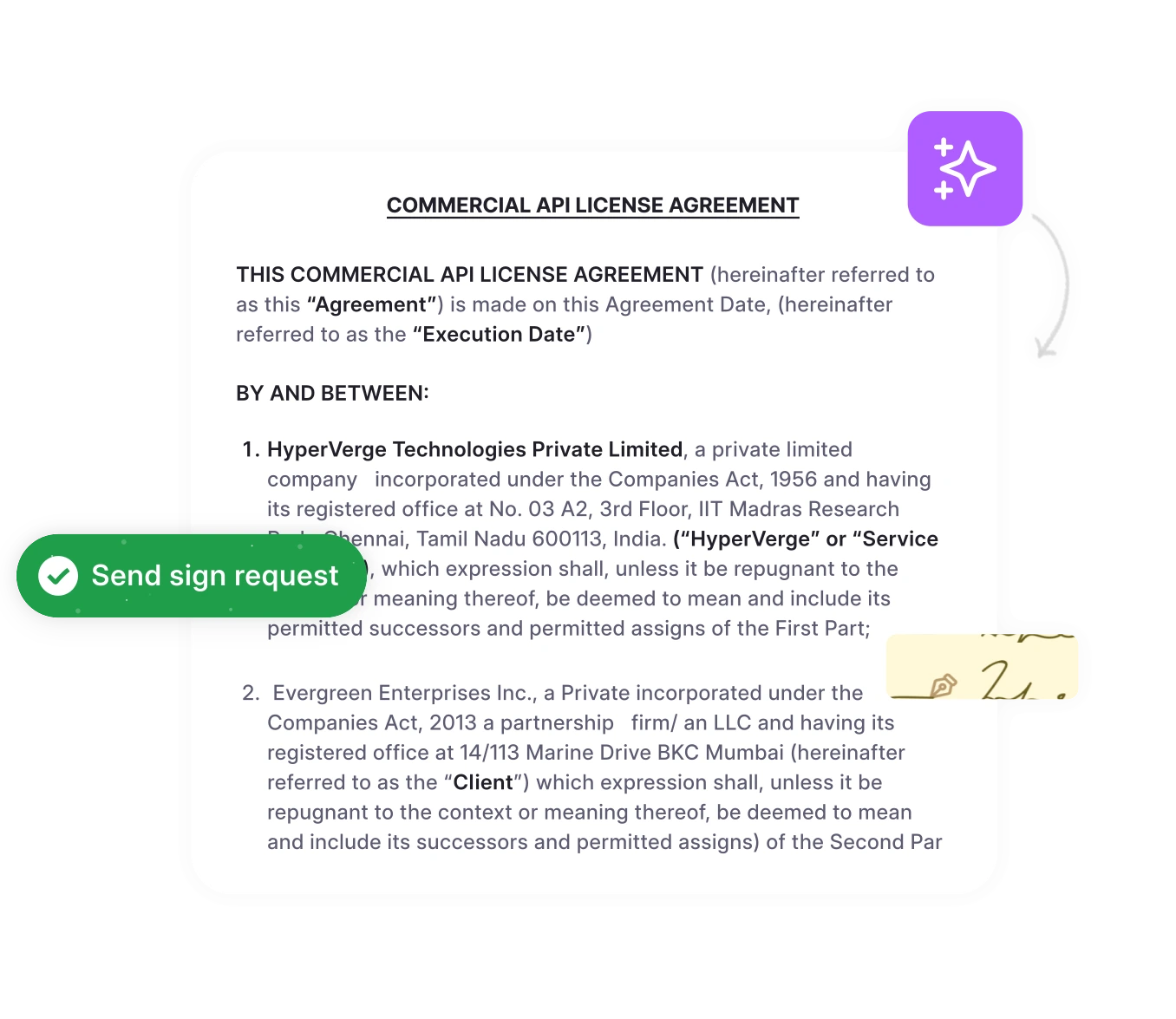Do you often struggle to find old contracts? Does your legal team spend hours locating contracts in different drives, folders, and cabinets? If so, your contract storage may be disorganized.
A survey conducted by EY Global revealed that over 49% of businesses don’t have a defined process to store contracts after execution. The same survey also states that 90% of contracting professionals find it challenging to locate stored contracts when required.
So how do businesses make their contracts accessible, visible, and organized? The answer is simple- by using a contract repository. This repository centralizes business contracts and makes agreements searchable, accessible, and secure.
This blog provides detailed information on contract repositories. Learn how to use a contract repository to store and manage contracts over time and maximize your contract visibility. Let’s start.
What is a contract repository?
A contract repository is a centralized document location that stores and organizes an organization’s signed contracts and agreements. Storing contracts in a document repository helps maintain a single source of truth where all documents are handled in one place.
Legal teams use contract repository software to manage the contract database centrally. Modern contract repository tools not only support storage but also offer advanced features like clause search, metadata tagging, audit trails, and integrations with CRMs and ERPs. This software helps store, organize, track, and analyze contracts—all post-signing stages of the contract lifecycle management process.
A contract repository is a centralized document location that stores and organizes an organization’s signed contracts and agreements. This is the most basic contract repository meaning—a single source of truth for all executed contracts, accessible to relevant stakeholders across departments.
A modern contract repository is an evolved version of a traditional ‘contract storage.’ While traditional contract storages can store contract data, they are inefficient in contract management. Let’s find out how.
What is the difference between traditional contract storage and a cloud-based contract repository?
TTraditional contract storage is an outdated mechanism businesses use to store contracts. This could mean any form of physical storage, from storing documents in cabinets to using Excel and Spreadsheets or even drive folders.
Therefore, it is possible to store contracts using traditional storage tools. However, these tools are not designed for handling contracts, and using them for contract management decreases CLM efficiency. Wondering why? Here’s a head-to-head comparison between traditional contract storage and modern repositories to give you a better overview of the two:
| Aspect | Traditional Contract Storage | Modern Contract Repository |
| Accessibility | ||
| Search Capability | ||
| Version Control | ||
| Compliance & Renewal Alerts | ||
| Security & Access Control |
Modern contract repositories are efficient, automated, and accessible compared to traditional storage mediums. Using a digital contract repository also has many other benefits like enhanced trackability, elevated analytics, and robust security. The coming section sheds light on the benefits of digital repositories.
Benefits of digital contract repositories

An efficient contract repository goes beyond just storing documents—it becomes the foundation of effective contract repository management. With automated workflows, permission controls, and AI-enabled sorting, teams can gain complete visibility into their post-signature processes. Why is investing in smart contract repository software and centralizing your contract portfolio a good idea? Here are some key benefits of repository-based contract storage.
1. Unifies contract storage, searching, sorting, and management
Scattered contract storage makes agreements difficult to trace, find, and prioritize. Businesses with high contract volumes often spend a lot of time finding old contracts when required. The result is increased contract administration time and higher contract regeneration costs. A repository centralizes both current and legacy contracts—especially useful for post-signature contract storage, where signed agreements must be preserved for future use, audits, and renewals.
A central contract repository helps store, search, sort, and manage all new and legacy contracts in the same place. If you’re looking for how to organize contracts systematically, a repository provides structured storage and easy retrieval. Advanced repositories like the one offered by HyperStart are efficient in pulling contracts regardless of their age. Finding contracts becomes easy with powerful searching, sorting, and organization functionalities.
2. Enables contract analytics
Analyzing contract data helps understand an organization’s contract management performance. Certain contract data points also give insights into department-wise performance. For example:
Sales: Contract signing time helps understand customer onboarding efficiency.
Finance: Average contract value helps with financial forecasting and budgeting.
HR: Employee contract renewal dates help renew employment bonds.
Procurement: Vendor contract expiration dates help with vendor management activities like renewal planning, deal renegotiation, and vendor hunting.
Using a contact repository system helps analyze all this contract data and gain actionable insights from it. Data visualization tools integrated with digital repositories help turn contract data into contract performance visualization dashboards to help understand contractual performance at any given time.
3. Streamlines contract tracking
A post-signature contract repository enables automated tracking of contractual milestones like renewal dates, payment terms, and SLA compliance—something traditional systems often fail to support. Tracking helps trace and fulfill contractual obligations, avoid legal penalties, and maintain positive relationships with counterparties. Traditional contract repositories don’t have built-in functionalities to track contracts.
A contract repository system effortlessly tracks key contract dates and other obligations. Contract management software like HyperStart automatically extracts important terms from contracts and generates alerts based on these terms. From never missing contract renewals again to tracking upcoming payments, digital storage is excellent in all matters.
4. Helps manage legacy contracts
Do you have a bundle of legacy contracts stored in cabinets, drives, and local folders? If so, a contract document repository can help you store all these agreements centrally and maintain a single source of truth.
Cloud-based contract repository software like HyperStart uses Artificial Intelligence (for PDF and Word contracts) and Optical Character Recognition (for paper and image contacts) to intake documents, extract information, and store and analyze legacy business agreements.
5. Enhances contract security
Contracts contain sensitive data on business, customers, strategies, and deals. Ensuring data security is often challenging with decentralized contract storage. Contract mismanagement leads to compliance issues, NDA violations, and legal troubles.
Digital contract repositories fix this problem through advanced security features like permission control, data encryption, and blockchain storage. These repositories make contracts easily accessible but at the same time secure through controlled access permissions. A secure contract repository offers role-based access controls, encryption, and tamper-proof audit trails—ensuring sensitive legal and commercial data is protected from unauthorized access.Repositories also track contract versions for a transparent audit trail and the utmost accountability.
6. Improves cost savings and ROI
Contracting costs can be soaring high when contracts are not stored optimally. Scattered storage across multiple locations results in missed obligations, revenue opportunities, and non-compliance issues.
Centrally storing contracts in a digital repository helps reduce overheads associated with contract storage. Moreover, well-organized digital repositories provide valuable insights into contracts—ensuring the full realization of business opportunities.
7. Mitigates risks and elevates compliance
Managing contract compliance is tricky, especially when contracts are stored in multiple locations across filing cabinets, ERPs, CRMs, HRMS, drives, and other storages. Lack of visibility over high-stake agreements often results in missed obligations, non-compliance, and ultimately breaches of contracts.
A digital repository auto-tracks critical contracts for compliance. With proper visibility, detailed audit trails, and automated reminders, contract managers can realize potential risks on time and take steps to elevate compliance, leaving nothing to chance.
Manage All Your Contracts in One Place
Skip contract hunting and easily find what you need with HyperStart’s AI-powered contract repository. Get a fully functional contract dashboard within 48 hours.
Essential features of modern contract repositories

1. Document import
Import contracts from sources like drives, CRMs, ERPs, cloud storage, and other platforms.
Maintain a single source of truth with two-way sync, ensuring the repository is always up-to-date.
Streamline contract migration with bulk import features, bringing all legacy contracts into a central, accessible location.
2. Metadata extraction
Extract critical contract details—like parties, key dates, contract values, and terms—automatically, turning contracts into actionable data.
Avoid manual entry with auto-tagging, simplifying contract organization and ensuring consistency across the repository.
Enable deeper insights with structured metadata that supports compliance tracking and fast information retrieval.
3. Data tagging
Organize contracts with smart tags and enable non-legal teams to manage contract data.
Boost search precision by tagging contracts with specific keywords, making retrieval both intuitive and instant.
Facilitate collaboration with shared tags that allow team members to easily find and work on relevant contracts.
4. Search and retrieval
Use advanced filters to narrow searches by date, contract type, status, and more, reducing search time significantly.
Instantly access vital contract information, empowering teams to make faster, data-driven decisions.
5. Contract sorting and filtering
Sort and filter contracts based on critical parameters like renewal dates, contract value, and contract status.
Prioritize at-a-glance with quick access to active, pending, or expired contracts, supporting timely actions.
6. Data visualization
Transform contract data into interactive dashboards and visual summaries for quick insights.
Identify trends and performance metrics in real-time, guiding strategic decision-making with ease.
Make complex data understandable, turning contract analytics into visualized, actionable intelligence.
7. Contract security
Protect sensitive data with robust role-based access control, ensuring only authorized personnel can view or edit.
Secure contracts with industry-grade encryption, preventing unauthorized access and data breaches.
Keep an auditable trail of user actions for full transparency, reinforcing compliance and trust.
8. Obligation tracking
Stay proactive with automated alerts for critical milestones—renewals, deadlines, and compliance checkpoints.
Avoid missed obligations with reminders sent directly to responsible parties, reducing risk and penalties.
9. AI analytics
Bulk-analyze contract data for automated reposting and performance monitoring.
Get real-time insights and make informed decisions during negotiation, renewal, and termination—all of it powered through data.
Enhance decision-making with predictive analytics, uncovering optimization opportunities and cost-saving potential.
10. Integrations
Connect your repository with CRMs, HRM systems, ERPs, and other business apps.
Streamline processes like contract request, review, approval, and signing across different platforms.
If you want to learn about the top CLM solutions, that offers the above features then check out our detailed blog on the best contract lifecycle management tools.
Contracts Made Available at Your Fingertips
Store, organize, analyze, and track all your contracts in one place through our AI-powered contract retrieval. Cut down contract admin time by 80% and focus on what matters.
By now, you know why a digital contract repository is important. However, a few additional factors must be considered while storing contracts in a digital contract repository. Let’s take a look at these factors.
Advanced contract repository capabilities
Regarding digital contract repositories, there are a few critical factors to keep in mind. Considering these factors helps ensure that your contracts are optimally stored, can be easily retrieved, and are available whenever required. Here are these factors:
Access control: Granular permission control helps increase contract visibility while ensuring the integrity of sensitive information. User-based access management is a must-have feature for all repositories.
AI-led automation: Digital agreement storage solutions with AI enablement help minimize storage, organization, and sorting time. AI helps with all storage processes—minimizing contract admin time.
Audit trails: Being able to run audit trails on contracts helps maintain transparency. Version control and change logs help keep the contract repository transparent, accountable, and secure.
Integration with third-party systems: Connecting your contract repository to external systems like CRMs and HR software helps automatically push signed contracts into the repository. This way, you can ensure all your contracts end up in the same place.
These were a few additional factors to remember while using a contract repository. Now that you know what’s important and what matters in contract storage, you are all set to implement a contract repository system and centralize your contracts.
Manage all contracts in one place with HyperStart
Unorganized contracts are harmful to your business processes. They act as bottlenecks in contract management strategy and hamper overall operational efficiency. Your business needs an intelligent, efficient, and feature-rich contract repository solution that streamlines contract handling.
Simplify contract storage and retrieval with HyperStart—your one-stop solution for contract lifecycle management. Our contract repository software helps overcome contract chaos and keep your agreements organized. Book a demo with our team today to start streamlining your contracts.









![A Guide to CLM Implementation [Steps + Benefits]](https://www.hyperstart.com/wp-content/uploads/2024/06/Blog-99-purple-scaled.webp)


